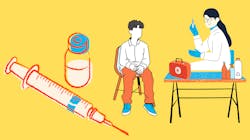FDA adds boosters for 12 through 15-year-olds for Pfizer-BioNTech COVID-19 vaccine
The U.S. Food and Drug Administration (FDA) amended the emergency use authorization (EUA) for the Pfizer-BioNTech COVID-19 Vaccine to:
- Expand the use of a single booster dose to include use in individuals 12 through 15 years of age.
- Shorten the time between the completion of primary vaccination of the Pfizer-BioNTech COVID-19 Vaccine and a booster dose to at least five months.
- Allow for a third primary series dose for certain immunocompromised children 5 through 11 years of age.
Boosters are now authorized for people 12 years of age and older. The action expands the use of a single booster dose of the Pfizer-BioNTech COVID-19 Vaccine to include its use in individuals as young as 12 years of age.
The agency has determined that the protective health benefits of a single booster dose of the Pfizer-BioNTech COVID-19 Vaccine to provide continued protection against COVID-19 and the associated serious consequences that can occur including hospitalization and death, outweigh the potential risks in individuals 12 through 15 years of age.
The FDA reviewed real-world data from Israel, including safety data from more than 6,300 individuals 12 through 15 years of age who received a booster dose of the vaccine at least 5 months following completion of the primary two-dose vaccination series.
These additional data enabled the FDA to reassess the benefits and risks of the use of a booster in the younger adolescent population in the setting of the current surge in COVID-19 cases.
The data shows there are no new safety concerns following a booster in this population. There were no new cases of myocarditis or pericarditis reported to date in these individuals.
While the change applies to the Pfizer-BioNTech COVID-19 Vaccine, the FDA continues to review data concerning all available vaccines and will provide additional updates as appropriate.
- A third primary series dose for certain immunocompromised children ages 5 through 11
- Children 5 through 11 years of age who have undergone solid organ transplantation, or who have been diagnosed with conditions that are considered to have an equivalent level of immunocompromise, may not respond adequately to the two-dose primary vaccination series. Thus, a third primary series dose has now been authorized for this group. This will now allow these children to receive the maximum potential benefit from vaccination.
The FDA previously authorized a third primary series dose for use as part of the primary immunization series in individuals 12 years and older. The potential effectiveness of an additional dose in children 5 through 11 years of age was extrapolated from data in adults.
Children 5 through 11 years of age who are fully vaccinated and are not immunocompromised do not need a third dose at this time, but the FDA will continue to review information and communicate with the public if data emerges suggesting booster doses are needed for this pediatric population.
The amendment to the EUA was granted to Pfizer Inc.
